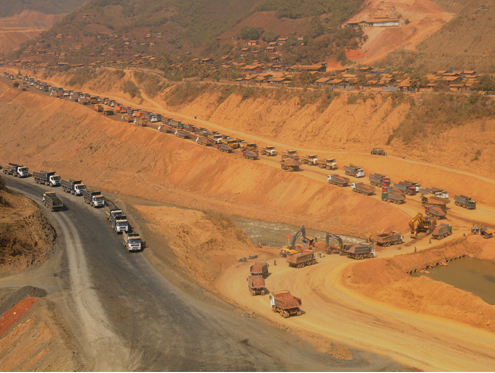Burma’s parliament is planning to review government spending on the deployment of army battalions to provide security for state-owned mining projects across the country, which is estimated to cost millions of kyat each year.
The upper house’s Mines and Natural Resources Committee has criticised the government for spending money allocated to the Ministry of Mines on military expenditures – a practice that dates back to the junta era.
The committee’s secretary, Hla Swe, told DVB that millions of kyat have been spent annually on the deployment of 16 army battalions to protect natural resource projects owned by six government ministries, including the Ministry of Mines, since former junta leader Ne Win’s rule.
“Ideally, the spending for security on extractive projects should be under the defence budget, but it has been designated to the ministries running the projects,” said Hla Swe. “We are going to suggest that it should be allocated to the defence budget.”
Hla Swe explained that the Ministry of Mines is currently paying for six army battalions deployed to Kachin state’s Hpakant jade mining region and a ruby mine in southern Shan state’s Mongshu, although he refused to disclose the amount spent.
Burma’s armed forces are already allocated over 20 percent or one fifth of the annual budget, compared to 4.4 percent on education and 3.7 percent on healthcare.
Militarisation near natural resource projects has been linked to an increase in fighting with ethnic minority rebels across the country, including the resource-rich Kachin state where conflict has raged for over two years. Last year, government troops pushed the Kachin Independence Army out of the Hpakant region as part of their northward offensive against the rebels.
[related]
On Monday, a report by Burma News International warned that natural resource investments in ethnic minority regions were likely to obstruct the peace process.
“Business concessions in ceasefire talks are also seen by some to be a ploy by the government to turn ethnic leaders into “mini-cronies” while also performing a public relations stunt to attract more foreign investors,” said the report.
The quasi-civilian government led by President Thein Sein has pledged to improve transparency and good governance in the country’s natural resource sector. But it is unclear whether he will be able to reform the notoriously secretive armed forces, which is known to have significant financial interests in Burma’s lucrative natural resource industries.
Billions of dollars are estimated to have gone missing from state coffers over decades of military rule. The military also enjoys the benefits of a Special Funds Law, announced in March 2011, which allows the army chief to channel unlimited finance to the military without parliamentary consent.



